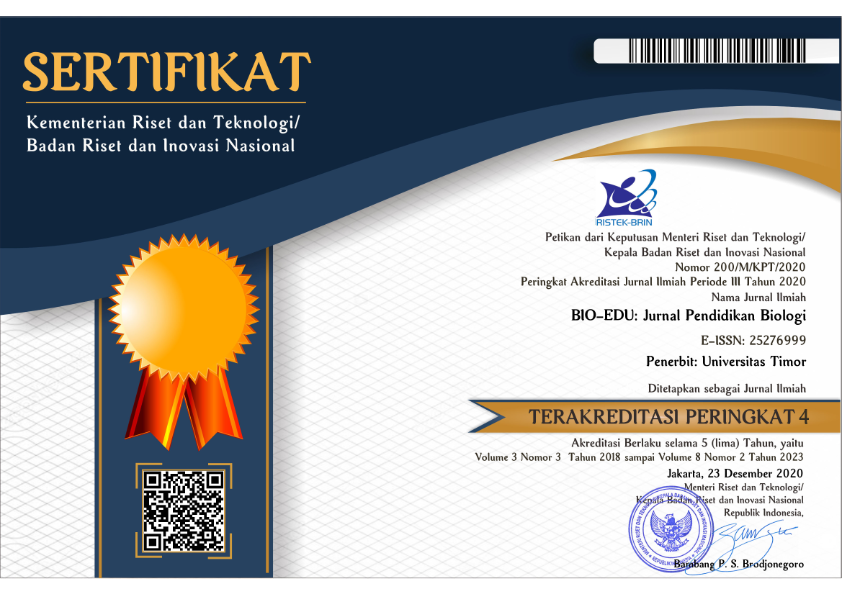MENINGKATKAN HASIL BELAJAR MENGGUNAKAN MODEL PROBLEM BASED LEARNING DI MAN 1 LABUHANBATU
DOI:
https://doi.org/10.32938/jbe.v7i3.1930Keywords:
Biology; Classroom Action Research; Problem Based Learning; CellAbstract
As for the background of the research on the results of direct observations at MAN 1 Labuhanbatu, the learning outcomes of cell material biology were disappointing. The research aims to see the effect of the Problem Based Learning Model on the Improvement of Biology Learning Outcomes for class XI students. The research was conducted at MAN 1 Labuhanbatu. The study population was 35 class XI students. They were using classroom action research methods, referring to Kemmis and Taggart design models. In the initial test, the mean score was 28.57%. In the first test, it increased 62.86%. The second stage increased, the mean of the second result was found to increase to 85.71%, an increase of 22.85% from the first stage test. The improvement of student learning outcomes in class XI MAN 1 Labuhanbatu in Biology Lessons with cell material ≥ 75% was successfully achieved. So that it can be concluded that the Problem Based Learning model can make the learning outcomes of students in class XI MAN 1 Labuhanbatu in Biology Lessons with cell material increase significantly.
References
Amir, M. T. (2016) Inovasi pendidikan melalui problem based learning. Prenada Media.
Chasanah, Y., Rohman, F. and Zubaidah, S. (2019) ‘Efektivitas Modul Keanekaragaman Hayati Berbasis Project Based Learning dalam Upaya Peningkatkan Hasil Belajar Kognitif Siswa SMA’, Jurnal Pendidikan: Teori, Penelitian, dan Pengembangan, 4(4), pp. 531–536.
Dewi, E. H. P., Akbari, S. and Nugroho, A. A. (2019) ‘Peningkatan aktivitas dan hasil belajar biologi melalui model problem based learning (PBL) pada materi pencemaran lingkungan siswa kelas X SMA Negeri 1 Jatisrono’, Journal of Biology Learning, 1(1).
Farisi, A., Hamid, A. and Melvina, M. (2017) ‘Pengaruh Model Pembelajaran Problem Based Learning terhadap Kemampuan Berpikir Kritis dalam Meningkatkan Hasil Belajar Siswa pada Konsep Suhu dan Kalor’, Jurnal Ilmiah Mahasiswa Pendidikan Fisika, 2(3), pp. 283–287.
Fauzan, M., Gani, A. and Syukri, M. (2017) ‘Penerapan model problem based learning pada pembelajaran materi sistem tata surya untuk meningkatkan hasil belajar siswa’, Jurnal Pendidikan Sains Indonesia (Indonesian Journal of Science Education), 5(1), pp. 27–35.
Handayani, N. S. (2017) ‘Penerapan Model Pembelajaran Problem Based Learning Untuk Meningkatkan Hasil Belajar Pada Subtema Manusia Dan Lingkungan (Penelitian Tindakan Kelas di kelas V SDN 184 Buah Batu Kota Bandung)’. FKIP Unpas.
Hariatik, H., Suciati, S. and Sugiyarto, S. (2017) ‘Belajar Biologi Metode Pembelajaran Berbasis Masalah Diikuti dengan DS Kepada Value Pembelajaran Dilihat Sesuai Kekuatan Menyelesaikan Permasalahan Tingkat 10’, Jurnal Pendidikan Biologi, 8(2), pp. 46–51.
Murtikusuma, R. P. (2015) ‘Pengembangan Komponen Pembelajaran Matematika Model Problem-Based Learning Berbantuan Media Powerpoint Untuk Siswa Kelas XI SMK Materi Barisan dan Deret’, Saintifika, 17(2).
Noviar, D. and Hastuti, D. R. (2015) ‘Pengaruh model problem based learning (pbl) berbasis scientific approach terhadap hasil belajar biologi siswa kelas x di sma n 2 banguntapan ta 2014/2015’, Bioedukasi: Jurnal Pendidikan Biologi, 8(2), pp. 42–47.
Purba, R. A. et al. (2020) Teknologi Pendidikan. Yayasan Kita Menulis.
Sani, R. A. (2014) ‘Pembelajaran saintifik untuk implementasi kurikulum 2013’. bumi aksara.
Sanjaya, D. R. H. W. (2016) Penelitian tindakan kelas. Prenada Media.
Selviani, I. (2019) ‘Pemaparan Materi Ajar Biologi Berbasis Masalah Guna Menaikkan Kekuatan Pola Pikir Aktif Anak Didikan SMA’, IJIS Edu: Indonesian Journal of Integrated Science Education, 1(2), pp. 147–154.
Sudarmanto, E. et al. (2021) Pengembangan Budaya Akademik. Yayasan Kita Menulis.
Supiandi, M. I. and Julung, H. (2016) ‘Efektivitas metode ajar Berbasis Masalah kepada kekuatan menyelesaian permasalahan serta nilai pembelajaran kognitif anak didik biologi SMA’, Jurnal Pendidikan Sains, 4(2), pp. 60–64.
Syam, A. and Amri, A. (2017) ‘Dampak percaya diri (self confidence) berbasis kader IMM kepada perolehan prestasi belajar mahasiswa (studi kasus di program studi pendidikan biologi fakultas keguruan dan ilmu pendidikan universitas muhammadiyah parepare)’, Jurnal Biotek, 5(1), pp. 87–102. Wulansari, B., Hanik, N. R. and Nugroho, A. A. (2019) ‘Menerapkan Metode Belajar Berbasis Masalah dengan Pemetaan Pikiran guna Menaikkan Nilai Pembelajaran pada Anak Didikan Tingkat 10 SMA Negeri 1 Tawangsari’, Journal of Biology Learning, 1(1).
Downloads
Published
Issue
Section
License
The Authors submitting a manuscript do so on the understanding that if accepted for publication, the copyright of the article shall be assigned to BIO-EDU: Jurnal Pendidikan Biologi and Departement of Biology Education, Universitas Timor as the publisher of the journal. Copyright encompasses rights to reproduce and deliver the article in all form and media, including reprints, photographs, microfilms, and any other similar reproductions, as well as translations.
BIO-EDU journal and Departement Biology Education, Universitas Timor, and the Editors make every effort to ensure that no wrong or misleading data, opinions, or statements be published in the journal. In any way, the contents of the articles and advertisements published in BIO-EDU are the sole and responsibility of their respective authors and advertisers.
Users of this website will be licensed to use materials from this website following the Creative Commons Attribution-ShareAlike 4.0 International License.



















